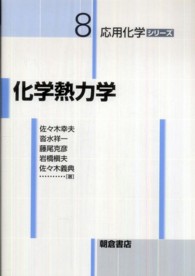- ホーム
- > 洋書
- > 英文書
- > Business / Economics
基本説明
Discusses in-depth political ecology, ecological justice, ecological economics and free trade with new insights on the challenges for organic agriculture.
Full Description
Modern agriculture and food systems, including organic agriculture, are undergoing a technological and structural modernisation and are faced with a growing globalisation. Organic agriculture (OA) can be seen as pioneering efforts to create sustainable development based on other principles than mainstream agriculture. There are however large differences between the challenges connected to, on one hand, modern farming and consumption in high-income countries and, on the other, smallholder farmers and resource poor consumers in low-income countries. The point of departure is the increasing globalisation and the production and trade of food and fodder and how this influences the role of OA. This book provides an overview of the potential role and challenges of organic agriculture in this global perspective, as seen from different perspectives such as sustainability, food security and fair trade.
Contents
1: Global trends in agriculture and food systems, 2: Globalisation and sustainable development: a potential ecology strategy to realize ecological justice, 3: Organic agriculture and ecological justice: Ethics and practice, 4: Ecological Economics and organic farming, 5: Organic farming in a world of free trade, 6: Certified and non-certified organic farming in the developing world, 7: Possibilities for closing the urban rural nutrient cycles, 8: Soil Fertility Depletion Sub-Saharan Africa: What is the Role of Organic Agriculture, 9: Sustainable veterinary medical practices in organic farming: a global perspective, 10: The impact of organic farming on food security in a regional and global perspective, 11: Towards a global research programme for organic food and farming, 12: Synthesis: The potential of organic farming in a globalised world,








